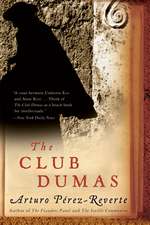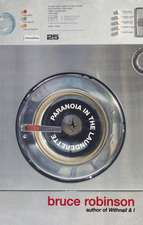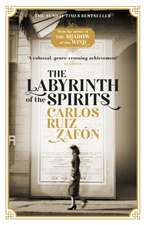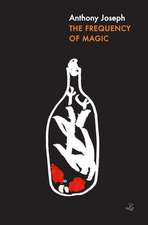Snow Falling on Cedars: reissued
Autor David Gutersonen Limba Engleză Paperback – 5 iul 2009
| Toate formatele și edițiile | Preț | Express |
|---|---|---|
| Paperback (2) | 63.97 lei 3-5 săpt. | +33.21 lei 6-12 zile |
| Bloomsbury Publishing – 5 iul 2009 | 63.97 lei 3-5 săpt. | +33.21 lei 6-12 zile |
| Vintage Publishing – 31 aug 1995 | 101.24 lei 3-5 săpt. |
Preț: 63.97 lei
Preț vechi: 83.18 lei
-23% Nou
12.24€ • 12.78$ • 10.13£
Carte disponibilă
Livrare economică 14-28 martie
Livrare express 27 februarie-05 martie pentru 43.20 lei
Specificații
ISBN-10: 140880140X
Pagini: 432
Dimensiuni: 129 x 198 x 26 mm
Greutate: 0.34 kg
Editura: Bloomsbury Publishing
Colecția Bloomsbury Paperbacks
Locul publicării:London, United Kingdom
Caracteristici
Notă biografică
Recenzii
'A skilfully constructed, deeply affecting story of love and death ... This is a hugely attractive book, written in clipped elegant prose'
'Compelling ... a flawlessly written first novel'
'Love and morality are beautifully choreographed into an exceptional debut novel'
Descriere
Extras
Hisao Imada was small enough most of the time, but he looked even smaller bundled up in his winter clothes, his hat pulled low and his scarf across his chin so that only his mouth, nose, and eyes showed. Ishmael knew he would not ask for help, in part because San Piedro people never did, in part because such was his character. Ishmael decided to park at the bottom of the grade beside Gordon Ostrom's mailbox and walk the fifty yards up South Beach Drive, keeping his DeSoto well out of the road while he convinced Hisao Imada to accept a ride from him.
Ishmael had known Hisao a long time. When he was eight years old he'd seen the Japanese man trudging along behind his swaybacked white plow horse: a Japanese man who carried a machete at his belt in order to cut down vine maples. His family lived in two canvas tents while they cleared their newly purchased property. They drew water from a feeder creek and warmed themselves at a slash pile kept burning by his children--girls in rubber boots, including Hatsue--who dragged branches and brought armfuls of brush to it. Hisao was lean and tough and worked methodically, never altering his pace. He wore a shoulder strap T-shirt, and this, coupled with the sharp-honed weapon at his belt, put Ishmael in mind of the pirates he'd read about in illustrated books his father had brought him from the Amity Harbor Public Library. But all of this was more than twenty years ago now, so that as he approached Hisao Imada in the South Beach Drive, Ishmael saw the man in another light: hapless, small in the storm, numb with the cold and ineffective with his shovel while the trees threatened to come down around him.
Ishmael saw something else, too. On the far side of the car, with her own shovel in hand, Hatsue worked without looking up. She was digging through the snow to the black earth of the cedar woods and throwing spadefuls of it underneath the tires.
Fifteen minutes later the three of them walked down the road toward his DeSoto. The Willys station wagon's rear right tire had been perforated by a fallen branch still wedged up under both axles. The rear length of exhaust pipe had been crushed, too. The car wasn't going anywhere--Ishmael could see that--but it took Hisao some time to accept this truth. With his shovel he'd struggled defiantly, as if the tool could indeed change the car's fate. After ten minutes of polite assistance Ishmael wondered aloud if his DeSoto wasn't the answer and persisted in this vein for five minutes more before Hisao yielded to it as an unavoidable evil. He opened his car door, put in his shovel, and came out with a bag of groceries and a gallon of kerosene. Hatsue, for her part, went on with her digging, saying nothing and keeping to the far side of the car, and throwing black earth beneath the tires.
At last her father rounded the Willys and spoke to her once in Japanese. She stopped her work and came into the road then, and Ishmael was granted a good look at her. He had spoken to her only the morning before in the second-floor hallway of the Island County Courthouse, where she'd sat on a bench with her back to an arched window just outside the assessor's office. Her hair had been woven then, as now, into a black knot against the nape of her neck. She'd told him four times to go away.
"Hello, Hatsue," said Ishmael. "I can give you a lift home, if you want."
"My father says he's accepted," Hatsue replied. "He says he's grateful for your help."
She followed her father and Ishmael down the hill, still carrying her shovel, to the DeSoto. When they were well on their way down South Beach Drive, easing through the flats along the salt water, Hisao explained in broken English that his daughter was staying with him during the trial; Ishmael could drop them at his house. Then he described how a branch had hurled down into the road in front of him; to avoid it he'd hit his brake pedal. The Willys had fishtailed while it climbed the snapped branch and nudged down into the drainage ditch.
Only once, driving and listening, nodding politely and inserting small exclamations of interest--"I see, I see, yes, of course, I can understand"--did Ishmael risk looking at Hatsue Miyamoto in the rectangle of his rearview mirror: a risk that filled all of two seconds. He saw then that she was staring out the side window with enormous deliberation, with intense concentration on the world outside his car--she was making it a point to be absorbed by the storm--and that her black hair was wringing wet with snow. Two strands had escaped from their immaculate arrangement and lay pasted against her frozen cheek.
"I know it's caused you trouble," Ishmael said. "But don't you think the snow is beautiful? Isn't it beautiful coming down?"
The boughs in the fir trees hung heavy with it, the fence rails and mailboxes wore mantles of it, the road before him lay filled with it, and there was no sign, anywhere, of people. Hisao Imada agreed that it was so--ah, yes, beautiful, he commented softly--and at the same moment his daughter turned swiftly forward so that her eyes met Ishmael's in the mirror. It was the cryptic look, he recognized, that she'd aimed at him fleetingly on the second floor of the courthouse when he'd tried to speak to her before her husband's trial. Ishmael still could not read what her eyes meant--punishment, sorrow, perhaps buried anger, perhaps all three simultaneously. Perhaps some sort of disappointment.
For the life of him, after all these years, he couldn't read the expression on her face. If Hisao wasn't present, he told himself, he'd ask her flat out what she was trying to say by looking at him with such detached severity and saying nothing at all. What, after all, had he done to her? What had she to be angry about? The anger, he thought, ought to be his own; yet years ago now the anger about her had finished gradually bleeding out of him and had slowly dried up and blown away. Nothing had replaced it, either. He had not found anything to take its place. When he saw her, as he sometimes did, in the aisles of Petersen's Grocery or on the street in Amity Harbor, he turned away from seeing her with just a little less hurry than she turned away from seeing him; they avoided one another rigorously. It had come to him one day three years before how immersed she was in her own existence. She'd knelt in front of Fisk's Hardware Center tying her daughter's shoelaces in bows, her purse on the sidewalk beside her. She hadn't known he was watching. He'd seen her kneeling and working on her daughter's shoes, and it had come to him what her life was. She was a married woman with children. She slept in the same bed every night with Kabuo Miyamoto. He had taught himself to forget as best he could. The only thing left was a vague sense of waiting for Hatsue--a fantasy--to return to him. How, exactly, this might be achieved he could not begin to imagine, but he could not keep himself from feeling that he was waiting and that these years were only an interim between other years he had passed and would pass again with Hatsue.
She spoke now, from the backseat, having turned again to look out the window. "Your newspaper," she said. That was all.
"Yes," answered Ishmael. "I'm listening."
"The trial, Kabuo's trial, is unfair," said Hatsue. "You should talk about that in your newspaper."
"What's unfair?" asked Ishmael. "What exactly is unfair? I'll be happy to write about it if you'll tell me."
She was still staring out the window at the snow with strands of wet hair pasted against her cheek. "It's all unfair," she told him bitterly. "Kabuo didn't kill anyone. It isn't in his heart to kill anyone. They brought in that sergeant to say he's a killer--that was just prejudice. Did you hear the things that man was saying? How Kabuo had it in his heart to kill? How horrible he is, a killer? Put it in your paper, about that man's testimony, how all of it was unfair. How the whole trial is unfair."
"I understand what you mean," answered Ishmael. "But I'm not a legal expert. I don't know if the judge should have suppressed Sergeant Maples's testimony. But I hope the jury comes in with the right verdict. I could write a column about that, maybe. How we all hope the justice system does its job. How we hope for an honest result."
"There shouldn't even be a trial," said Hatsue. "The whole thing is wrong, it's wrong"
"I'm bothered, too, when things are unfair," Ishmael said to her. "But sometimes I wonder if unfairness isn't . . . part of things. I wonder if we should even expect fairness, if we should assume we have some sort of right to it. Or if--"
"I'm not talking about the whole universe," cut in Hatsue. "I'm talking about people--the sheriff, that prosecutor, the judge, you. People who can do things because they run newspapers or arrest people or convict them or decide about their lives. People don't have to be unfair, do they? That isn't just part of things, when people are unfair to somebody."
"No, it isn't," Ishmael replied coldly. "You're right--people don't have to be unfair."
When he let them out beside the Imadas' mailbox he felt that somehow he had gained the upper hand--he had an emotional advantage. He had spoken with her and she had spoken back, wanting something from him. She'd volunteered a desire. The strain between them, the hostility he felt--it was better than nothing, he decided. It was an emotion of some sort they shared. He sat in the DeSoto and watched Hatsue trudge away through the falling snow, carrying her shovel on her shoulder. It occurred to him that her husband was going out of her life in the same way he himself once had. There had been circumstances then and there were circumstances now; there were things beyond anyone's control. Neither he nor Hatsue had wanted the war to come--neither of them had wanted that intrusion. But now her husband was accused of murder, and that changed things between them.
Textul de pe ultima copertă
In the course of the ensuing trial, it becomes clear that what is at stake is more than one man's guilt. For on San Piedro, memory grows as thickly as cedar trees and the fields of ripe strawberries -- memories of a charmed love affair between a white boy and the Japanese girl who grew up to become Kabuo's wife; memories of land desired, paid for, and lost. Above all, San Piedro is haunted by the memory of what happened to its Japanese residents during World War II, when an entire community was sent into exile while its neighbors watched. Gripping, tragic, and densely atmospheric, Snow Falling on Cedars is a masterpiece of suspense -- but one that leaves us shaken and changed.















